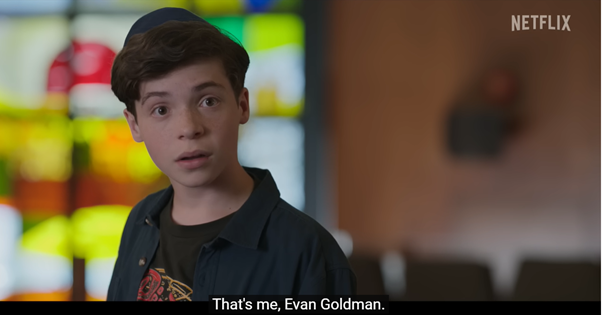
Lifestyle

Barmitzvah movies raise the bar on coming-of-age theme
“Raise your voice, even if it cracks.” Building on a tagline that’s imminently relatable for anyone who has ever had – or attended – a Barmitzvah, recent Netflix release 13: The Musical embodies the themes that this Jewish rite of passage offers filmmakers. And it’s not the only recent film to do so.
“Old and young, modern and traditional. These contrasts seem like a perfect vehicle for a movie because that’s what good movies are all about – conflict. A Barmitzvah lends itself so well to that. There’s tension, drama, and humour.” So says local media expert Gus Silber, speaking about the current Barmitzvah movie trend.
Based on a 2008 Broadway musical, a collaboration between Jewish writers Robert Horn and Dan Elish and composer and lyricist Jason Robert Brown, 13: The Musical has been adapted to suit 2022 Netflix audiences. A quintessential family movie very much aimed at tweens and young teens, it examines universal challenges such as fitting in, starting over, and coming of age.
The film doesn’t just examine the trials and tribulations faced by a boy dealing with his parents’ divorce, life in a new town, and his impending Barmitzvah, it also boasts a host of catchy musical numbers and a touch of quintessentially Jewish humour. We wouldn’t be surprised to see it on our own schools’ stages in the not-too-distant future.
“The idea of a musical centred on a Barmitzvah is a very good one,” says Silber. “Musicals have made somewhat of a return, especially on streaming media. A good musical will always get audiences because good songs and dancing coupled with a good storyline is a traditional formula that one can always revive and have fun with.”
Also released this year and centred on the world of Barmitzvahs and Batmitzvahs, Cha Cha Real Smooth – available on Apple TV+ – is geared more towards adult audiences. It’s about a 22-year-old man who lacks direction and starts working as a party starter at these events, getting people out of their seats and onto the dance floor. Yes, it’s a real job – at least it is in the United States. Along the way, he falls for a single mother, played by Dakota Johnson.
The film “takes the Barmitzvah’s central coming-of-age idea, that a single ritual at the appropriate time marks the true threshold of adulthood, and runs with it in an unexpected manner”, writes Andrew Lapin in a JTA article. It applies this idea to a man in his early 20s navigating the complexities that come with truly becoming an adult.
Writer-director Cooper Raiff, who also stars in the film, is, in fact, not Jewish but loved the opportunities such a setting presented. Growing up in a wealthy Jewish community in Dallas, he was exposed to the Barmitzvah ceremony itself as well as the social implications of the celebration.
As Silber says, “Barmitzvahs and Batmitzvahs aren’t just coming-of-age occasions in many communities, they’re also huge social and cultural events. There’s a lot of criticism about this.” That’s mainly because over-the-top celebrations often usurp the actual meaning of the day. “For somebody making a movie, there’s so much material.”
Raiff, however, was reportedly intrigued by the Barmitzvah itself as well as the impact of placing significant attention and expectation on a 13-year-old. “It’s such an awkward time,” says Silber. “Everyone remembers being 13, you’re like not grown up and you’re also not a kid, and then suddenly, you have this massive, ancient ritual of which you’re a part – becoming a man – and it’s scary. A good Barmitzvah movie will play on that fear as well.”
Naturally the popular coming-of-age theme implicit in any Barmitzvah movie has long been a popular Hollywood trope, but there’s more to it than that, he says. “It’s not some random teenager experience. A Barmitzvah movie has a very specific occasion at a very definite age at its heart, which makes it slightly different to other coming-of-age movies. There’s the whole tradition, the ritual.
“What’s key is that these films work very well as Jewish movies but they’re also completely universal. You don’t need to understand a single word of Hebrew or the intricacies of a Barmitzvah, you just buy into an experience.”
With multiple Jewish screenwriters and directors wanting to relive their experiences, there have long been films and TV shows that have delved into the world of Barmitzvahs, says Silber. Yet the current trend brings them into the realm of popular culture for a new generation. They’re also capitalising on the rich storytelling potential they offer as well as their cross-cultural resonance.
Batmitzvah movies are set to follow the upsurge. Adam Sandler is, in fact, working on Netflix teen comedy called You Are So Not Invited to My Bat Mitzvah based on the popular novel by Fiona Rosenbloom. For Sandler, it’s a family affair, with his wife, Jackie, and two teenage daughters, Sunny and Sadie, set to co-star. “If Adam Sandler is doing a Batmitzvah or Barmitzvah movie, you can definitely say it’s a trend,” says Silber. “When big stars start pitching projects around what seems like a small theme to big studios, then you just know it’s crossed over into the big time.”
Streaming culture has also contributed to this trend, Silber says. “The popularity of Barmitzvah or Batmitzvah movies now spreads quickly through word of mouth so those that may have been small at the box office suddenly get significant interest. People talk about them, especially because they’re feel-good films.”
Their upbeat nature is particularly appealing in the context of the trials the world has faced over the past couple of years. “It tends to inspire other feel-good movies. There are always lessons that arise from these films, and while you can sometimes see them coming a mile away especially in more formulaic scripts, they do work well in this context.”
Ultimately, a good Barmitzvah movie will also be able to cross age boundaries, so children, parents, grandparents, and peers will be able to buy into it, says Silber. “These new films fall into a very old tradition of coming-of-age movies. They’re just upgrading and universalising them for a new global audience and a new way of presenting movies, which is crucial for anyone who produces anything these days.”










